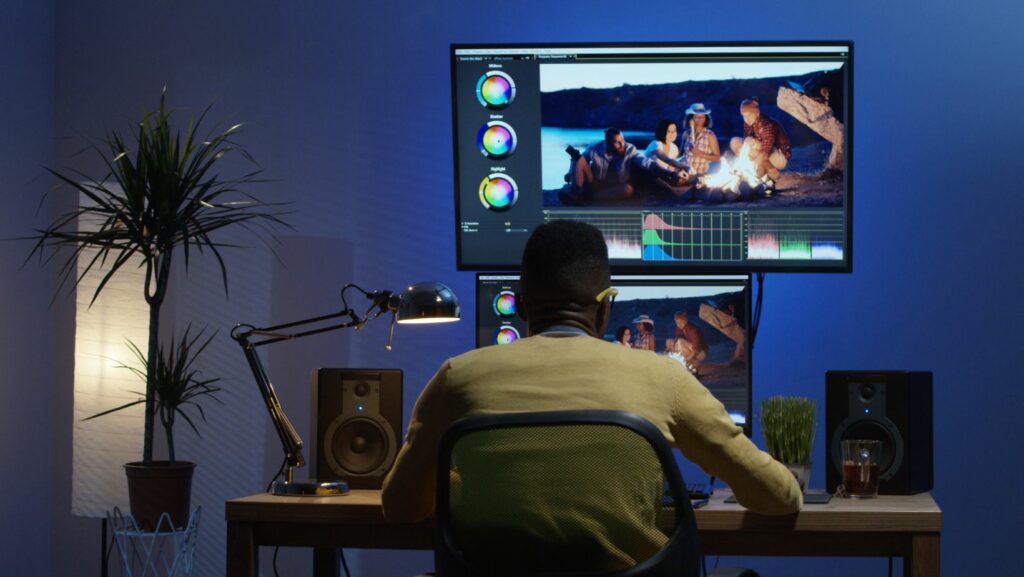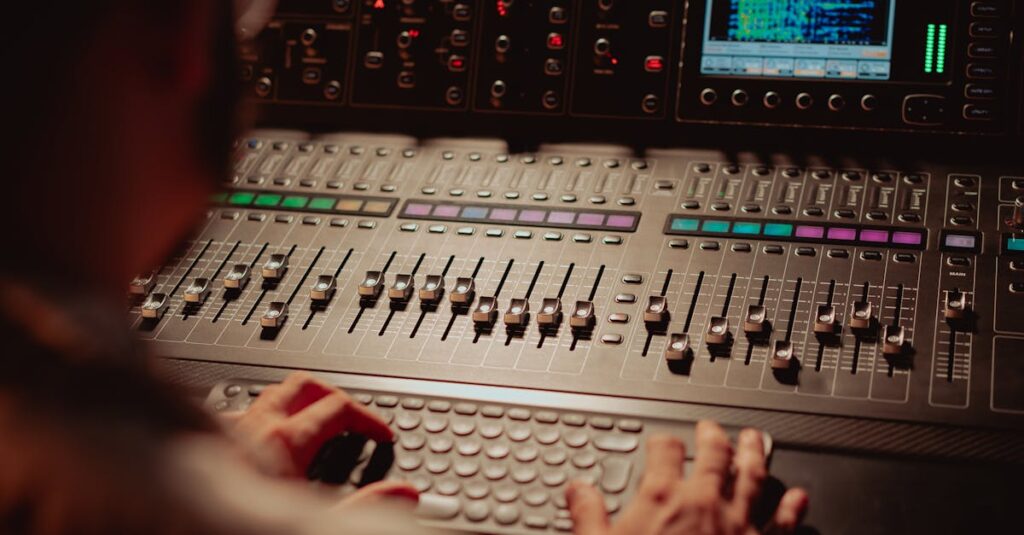Modern music production has evolved far beyond traditional recording studios. Today’s producers need powerful computers that can handle complex audio processing virtual instruments and multiple recording tracks simultaneously. A dedicated music production computer serves as the backbone of any home or professional studio setup.
Whether someone’s producing hip-hop beats or orchestral compositions a well-configured production PC can make the difference between smooth workflow and frustrating technical limitations. With the right combination of processing power RAM storage and audio interfaces producers can focus on creativity rather than wrestling with system crashes or latency issues. The market offers various options from custom-built PCs to specialized pre-configured systems designed specifically for audio production.
Music Production Computer
A great music production computer combines specific hardware components with optimized performance capabilities to handle demanding audio tasks. Each component plays a crucial role in creating a seamless music production experience.
Essential Hardware Requirements
The foundation of a music production computer rests on five key hardware components:
- CPU (Processor): Intel Core i7/i9 or AMD Ryzen 7/9 processors with 6+ cores deliver the processing power needed for running multiple virtual instruments simultaneously
- RAM: 32GB DDR4 memory enables smooth operation of large sample libraries plugins like orchestral instruments strings pianos
- Storage: Dual-drive setup with 500GB+ NVMe SSD for system/DAW software 2TB+ SATA SSD for sample libraries audio files projects
- Motherboard: Professional audio-focused motherboards featuring high-quality integrated audio codecs multiple PCIe slots stable power delivery
- Power Supply: 650W+ gold-rated PSU with clean power output minimizes electrical interference noise in audio signals
Performance Benchmarks to Consider
Key performance metrics define a computer’s music production capabilities:
| Benchmark Category | Minimum Requirement | Recommended Specification |
|---|---|---|
| CPU Single-Core Speed | 4.0 GHz | 5.0 GHz |
| CPU Multi-Core Score | 15,000 | 25,000+ |
| Memory Bandwidth | 40 GB/s | 50+ GB/s |
| Storage Read Speed | 2,000 MB/s | 3,500+ MB/s |
| DPC Latency | <1000 μs | <500 μs |
- Buffer Size: Ability to run at 128 samples without dropouts indicates stable real-time processing
- Plugin Count: Capacity to handle 50+ simultaneous VST plugins demonstrates system stability
- Project Load Time: Loading complex projects under 30 seconds shows efficient resource management
- Real-time Effects: Processing 20+ audio effects chains without latency proves system capability
- Multi-track Recording: Recording 16+ simultaneous tracks at 24-bit/96kHz validates system performance
Best Operating Systems for Music Production
Operating systems serve as the foundation for music production software performing complex audio processing tasks. Each platform offers distinct advantages for different types of music producers based on their workflow requirements.
Windows vs Mac for Audio Work
Windows and macOS dominate the music production landscape with distinct characteristics:
Windows Advantages:
- Supports a broader range of Digital Audio Workstations (DAWs) including FL Studio Pro Tools
- Offers hardware customization options for cost-effective upgrades
- Provides compatibility with more third-party plugins VSTs
- Features lower initial setup costs for comparable performance specs
macOS Advantages:
- Includes Core Audio drivers for plug-and-play functionality
- Delivers optimized performance with Logic Pro X GarageBand
- Maintains consistent system stability through controlled hardware integration
- Provides seamless integration between Apple audio devices interfaces
| Feature | Windows | macOS |
|---|---|---|
| Latency Range | 5-12ms | 3-8ms |
| CPU Overhead | 8-15% | 5-12% |
| Plugin Compatibility | 95% | 85% |
| Price Range | $800-3000 | $1200-6000 |
Both operating systems excel at audio production when paired with appropriate hardware specifications. Windows offers flexibility customization while macOS provides integrated reliability. The choice depends on specific software requirements budget constraints production goals.
Note: The statistics presented reflect standard configurations current market analysis as of 2023.
Critical Components for Music Production
A music production computer requires specific hardware components to deliver optimal performance for audio processing tasks. These components work together to create a stable foundation for recording, mixing, and producing music.
CPU and Processing Power
Modern music production demands processors that excel at managing multiple audio tracks and plugins simultaneously. The Intel Core i7/i9 or AMD Ryzen 7/9 series processors with 8+ cores operate at frequencies above 3.5GHz, providing the computational power for complex audio processing tasks. These processors handle:
- Real-time audio effects processing for 50+ tracks
- Virtual instrument rendering with minimal latency
- Background tasks like audio file conversion
- Multi-track recording at 24-bit/192kHz
RAM and Storage Solutions
Professional music production requires substantial memory and fast storage configurations for seamless operation. The recommended specifications include:
| Component | Minimum Spec | Optimal Spec |
|---|---|---|
| RAM | 16GB DDR4 | 32GB+ DDR4-3200 |
| System Drive | 500GB SSD | 1TB NVMe SSD |
| Sample Drive | 1TB SSD | 2TB+ SSD |
Key storage considerations include:
- Separate drives for system files and audio samples
- NVMe SSDs for faster project loading times
- Regular backup drives for project files
- RAID configurations for professional studios
- Low-latency drivers (ASIO for Windows, Core Audio for macOS)
- Multiple input/output connections (XLR, TRS, MIDI)
- High-quality digital-to-analog converters (24-bit/192kHz)
- Thunderbolt 3/USB-C connectivity for maximum bandwidth
- Compatible expansion protocols (ADAT, S/PDIF, WordClock)
Optimizing Your Computer for Music Production
Optimizing a computer for music production requires specific system configurations to minimize latency and maximize audio processing capabilities. These optimizations enhance real-time audio performance and ensure stable recording sessions.
BIOS and System Settings
BIOS optimization focuses on disabling power management features that interfere with audio processing. Key adjustments include:
- Disable C-States power management to maintain consistent CPU performance
- Turn off Intel SpeedStep or AMD Cool’n’Quiet to prevent frequency scaling
- Set CPU power management to “High Performance” mode
- Deactivate USB selective suspend settings
- Adjust PCIe configurations to “Gen3” or higher for improved bandwidth
- Enable XMP profiles for RAM optimization
- Disable Windows Defender real-time monitoring during recording sessions
- Turn off Windows Update services temporarily
- Close web browsers Chrome Firefox that consume RAM
- End unnecessary system tray applications Dropbox OneDrive
- Disable system sounds Windows sound scheme
- Configure antivirus software to exclude DAW folders VST plugins
- Set audio applications to high process priority through Task Manager
- Remove startup programs that auto-launch with Windows
| Process Type | RAM Usage | CPU Impact |
|---|---|---|
| Web Browser | 500MB-2GB | 5-15% |
| Cloud Storage | 150-300MB | 2-5% |
| Antivirus | 200-400MB | 3-8% |
| System Services | 100-250MB | 1-4% |
Popular Music Production Computer Setups
Professional music producers rely on specific computer configurations optimized for audio production tasks. These setups range from powerful desktop workstations to portable laptop solutions designed to handle complex music production workflows.
Desktop Workstations
Desktop workstations offer extensive connectivity options and superior processing power for music production. Here are common desktop configurations:
- High-End Intel Setup
- Intel Core i9-13900K processor
- 64GB DDR5 RAM
- 2TB NVMe SSD + 4TB HDD
- Thunderbolt 4 audio interface compatibility
- Multiple display support for DAW workflow
- AMD Production Build
- AMD Ryzen 9 7950X processor
- 32GB DDR5 RAM
- 1TB NVMe SSD + 2TB SSD
- PCIe 4.0 expansion capabilities
- Multi-channel audio interface support
- MacBook Pro Setup
- M2 Pro/Max processor
- 32GB unified memory
- 1TB SSD storage
- Built-in audio processing
- Compatible with Thunderbolt audio interfaces
- Windows Laptop Build
- Intel Core i7-13700H processor
- 32GB DDR5 RAM
- 1TB NVMe SSD
- USB-C connectivity
- ASIO driver support
| Setup Type | Processor | RAM | Storage | Starting Price |
|---|---|---|---|---|
| High-End Desktop | i9-13900K/R9 7950X | 64GB | 6TB Total | $2,500 |
| Mid-Range Desktop | i7-13700K/R7 7700X | 32GB | 3TB Total | $1,800 |
| Premium Laptop | M2 Pro/i9-13900H | 32GB | 1TB SSD | $2,000 |
| Mid-Range Laptop | i7-13700H/R7 7745H | 16GB | 512GB SSD | $1,200 |
Cornerstone of Modern Music Creation
A dedicated music production computer stands as the cornerstone of modern music creation. The right combination of powerful hardware specifications reliable operating systems and optimized settings can transform the music production experience. Whether choosing a custom-built PC or a specialized pre-configured system producers should focus on their specific needs and workflow requirements.
The investment in a properly configured music production computer will pay dividends through enhanced creativity stable performance and professional-quality output. As technology continues to evolve these digital workstations will remain essential tools for musicians producers and audio professionals worldwide.



